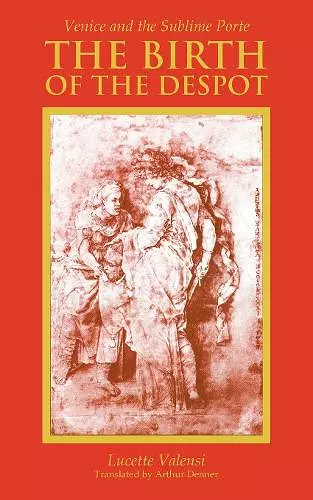The Birth of the Despot
Venice and the Sublime Porte
Lucette Valensi author Arthur Denner translator
Format:Hardback
Publisher:Cornell University Press
Published:7th Dec '93
Currently unavailable, and unfortunately no date known when it will be back
This hardback is available in another edition too:
- Paperback£24.99(9780801475436)

In her graceful account of the transformation of European attitudes toward the Ottoman empire during the sixteenth and seventeenth centuries, Lucette Valensi follows the genealogy of the concept of Oriental despotism. The Birth of the Despot examines a crucial moment in the long and ambiguous encounter between the Christian and Islamic worlds: the period after the fall of Constantinople to the Turks, when Venice's pursuit of its commercial and maritime interests brought two powerful protagonists—Venice and the Sublime Porte—face-to-face. Vivaldi's oratorio Juditha Triumphans, in which Judith liberates her besieged town by killing the Turk Holofernes, serves as the organizing metaphor in Valensi's study of how Venice's perceptions of its rival changed. Valensi shows how Venice's initial admiration for the sultan and his orderly empire metamorphosed into revulsion at a monstrous tyrant.
In The Birth of the Despot, Lucette Valensi argues that the developing discourse on the Oriental despot indicated both disquiet at the prospect that that the Turks were more likely than any Christian king to reunite Europe, and reaction against domestic shifts in power from the nobility to kings and signori.... Her book is beautifully organized and written. Shaped like an oratorio, it follows a simple narrative line in intricate melodies that are pristine and classical in form.
* Middle East Journal *Lucette Valensi's essay is an elegant, almost lyrical historical study.... Her study makes some important corrections to traditional assumptions of how Venetians perceived and appropriated the image of the Ottoman Empire in the early modern era.
* Sixteenth Century Journal *Using reports read to the doge and senate by ambassadors and envoys extraordinary to the Porte on their return home, Lucette Valensi analyzes their portrayals of Sultans within the context of Renaissance literary traditions. The origins and etymological evolution of the word 'despot,' its attachment to the Sultans, and its emigration into contemporary usage in modern European languages form a central theme. Valensi tells a fascinating story, using the structure of Vivaldi's operatic rendition of the biblical parable of Judith and Holofernes as the organizing principle. She offers important historical insights as well, for Venice was surely better informed about the Turk than any other western polity. The story begins with visions of the Sultan as the model of an enlightened Renaissance prince in all but religion, and ends with an arbitrary and bloodthirsty Mehmet IV driven by strange appetites and unknowable impulses, the very image of Montesquieu's Oriental despot. The style is polished; the organization effective; the insights into the educational methods, rhetoric, and modes of thought of late Renaissance Venice fascinating.
* The International History ReviISBN: 9780801424809
Dimensions: 203mm x 127mm x 18mm
Weight: 454g
132 pages